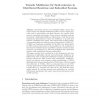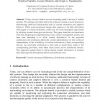152
Voted
DAIS
2008
15 years 3 months ago
2008
Context management in pervasive computing environments must reflect the specific characteristics of these environments, e.g. distribution, mobility, resource-constrained devices, o...
108
click to vote
DAIS
2008
15 years 3 months ago
2008
In self-adaptive systems, metadata about resources in the system (e.g., services, nodes) must be dynamically published, updated, and discarded. Current adaptive middleware approach...
138
click to vote
DAIS
2008
15 years 3 months ago
2008
Distributed real-time and embedded (DRE) systems often require support for multiple simultaneous quality of service (QoS) properties, such as real-timeliness and fault tolerance, t...
138
click to vote
DAIS
2007
15 years 3 months ago
2007
Constructing and executing distributed applications that can adapt to their current operating context, in order to maintain or enhance Quality of Service (QoS) attribute levels, ar...
113
click to vote
DAIS
2007
15 years 3 months ago
2007
Implementing context-dependent behaviour of pervasive computing applications puts a great burden on programmers: Devices need to continuously adapt not only to their own context, b...
134
click to vote
DAIS
2007
15 years 3 months ago
2007
Today, one can observe an ever increasing trend in the use of mobile systems. This change inevitably affects the software running on such devices by necessitating additional functi...
104
click to vote
DAIS
2007
15 years 3 months ago
2007
The present emergence of loosely-coupled, inter-enterprise collaboration, i.e., virtual organizations calls for new kind of middleware: generic, common facilities for managing cont...
DAIS
2007
15 years 3 months ago
2007
Abstract. Replication systems require a state-transfer mechanism in order to recover crashed replicas and to integrate new ones into replication groups. This paper presents and eva...
108
click to vote
DAIS
2007
15 years 3 months ago
2007
Because they are required to support component deployment and composition, modern execution environments embody a number of common features such as dynamic linking and support for ...



